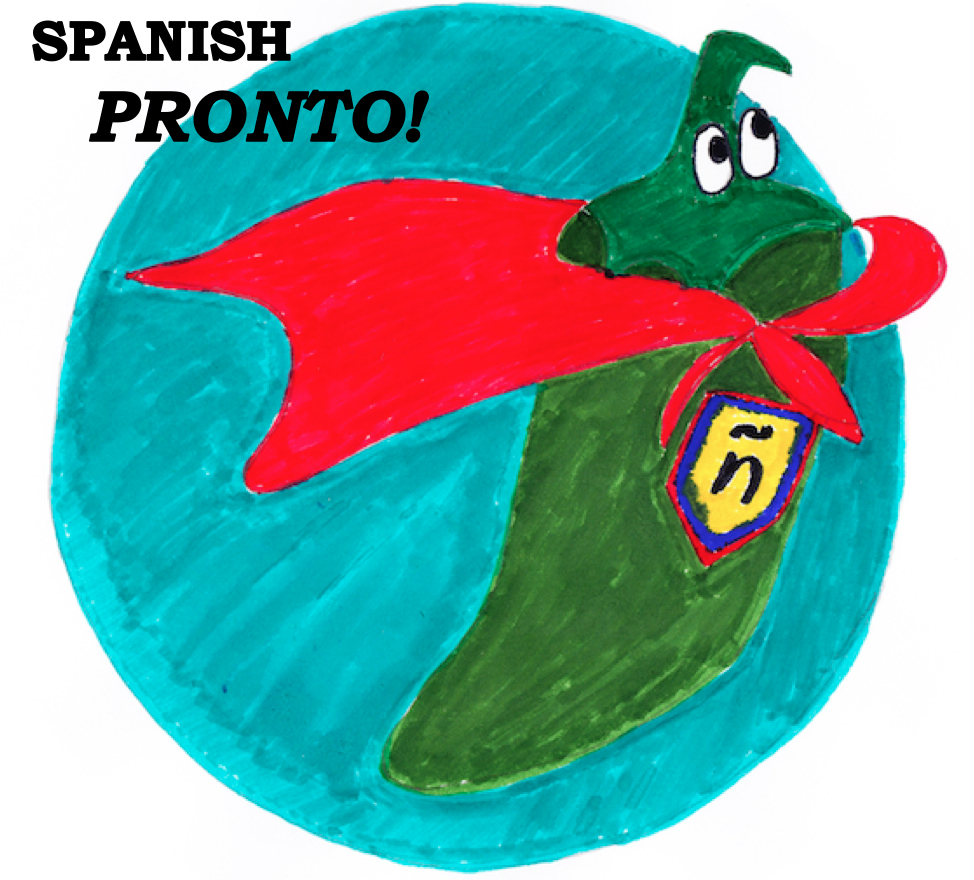
Spanish Vocabulary
Learn 10 Spanish words per day and know 2,500 words after one year!Many words in Spanish and English are similar, but similar words can have very different meanings, so be careful.
forma way, manner; form, shapecasa house; home
España Spain
lugar place
trabajo work
partido party [politics]; game [sports] (partida game [cards, chess])
cosa thing
ciudad city
tipo type, kind; guy [m.]
agua water
Words pronunciation: 0:25 (25s)
'La casa' is 'the house,' so 'voy a la casa' would would be understood as 'I am going to the house' (or as 'I am going to my/our house'). Removing the 'la' ('the') changes the meaning in an important way: 'Voy a casa' is understood as 'I am going home' (or as 'I am going to my/our home,' which is really the same thing). Likewise, 'estoy en la casa' is 'I am in the house,' but 'estoy en casa' is 'I am at home.'
Spain (and Spanish) were not always as they are today. One very easy-to-remember fact is that the Moors (Berbers and Arabs) were in Spain from 711 (a "convenient" date to "store" in your memory) until 1492 (the same year "[In 1492,] Columbus sailed the ocean blue"). The Christian effort to retake Spain was known as 'la Reconquista' ('the Reconquest'). La Reconquista is also the term used, usually lightheartedly, to describe the increasingly Hispanic population of the parts of the United States that used to belong to Mexico (i.e., California, Nevada, Utah, New Mexico, Arizona, Colorado, Wyoming, Texas) or even Spain (Florida and the "Louisiana" Purchase [the area between the Mississippi River and the Rocky Mountains, which did belong to France in 1800-1803, but belonged to Spain in 1765-1800]). In some senses, this Reconquista has 'succeeded,' as the United States now has more Spanish speakers than any Spanish-speaking country (Colombia, Spain, Argentina, etc.), except for Mexico, which is still 'número uno' (number one). It is also worth remembering that, as you will hear from the many families who have been in the American Southwest for generations, "We did not cross the border. The border crossed us."
Spanish-speaking population by country (2016 estimates):
1. Mexico: 122.3 million (118.4 M native proficiency, 3.9 M limited Spanish proficiency)
2. United States: 61.0 million (including Puerto Rico's 3.5 million; 46.0 M native, 15.0 M limited Spanish)
3. Colombia: 48.5 million (48.1 M native, 0.4 M limited Spanish)
4. Spain: 46.6 million (42.9 M native, 3.7 M limited Spanish)
5. Argentina: 43.6 million (42.8 M native, 0.8 M limited Spanish)
6. European Union (not including Spain): 32.4 million (1.4 M native, 31.0 M limited Spanish)
7. Peru: 31.5 million (27.3 M native, 4.2 M limited Spanish)
8. Venezuela: 31.0 million (30.2 M , 0.8* M limited Spanish)
9. Chile: 18 million, 10. Guatemala, 11. Ecuador, 12. Cuba, 13. Bolivia, 14. Dominican Republic, 15. Honduras, 16. Paraguay, 17. El Salvador, 18. Nicaragua, 19. Costa Rica, 20. Panama, 21. Puerto Rico, 22. Uruguay, 23. Morocco, 24. Equatorial Guinea, 25. Canada, 27. Brazil, 28. Australia, 29. Philippines, 30. Algeria, 31. Belize, 32. Israel, 33. Netherlands Antilles, 34. Switzerland, 35. Japan: 108,000
Source: https://cvc.cervantes.es/lengua/espanol_lengua_viva/pdf/espanol_lengua_viva_2016.pdf (Updated numbers available by modifying this URL address to show the current year.)
*For Venezuela, the 2016 edition shows 8.2 M limited Spanish speakers, but the 2017 shows it as 0.8 M, which is far more likely. I have corrrected it here.
'Agua' is a feminine word, but because Spanish does not allow the word 'la' to appear immediately before a word beginning with an stressed 'a' or 'ha,' 'the water' is expressed as 'el agua.' The same is true for words such as 'el hacha' ('the axe') and 'el águila' ('the eagle'). However, if the stressed syllable is not the first one, then 'la' is used: 'la arena' (la ah-RAY-nah), 'la hamaca' (la ah-MAH-cah; remember that 'h' is generally silent in Spanish). Even if a feminine word uses 'el' immediately before it, the word is still feminine, so it is correct to say 'el agua fría' ('the cold water') and 'la cristalina agua' ('the crystalline water'; adjectives come before nouns when they describe an inherent quality of the noun rather than a differentiating characteristic of the named item: 'la blanca nieve' ['the white snow'] vs. 'el carro blanco' ['the white car']).
ella siempre está en forma she is always in (good physical) shapesu lugar de trabajo queda a pocas cuadras de su casa his workplace ('place of work') is located a few blocks away from his house
mi profesor me retó a una partida de ajedrez my professor challenged me to a game of chess
ese tipo, ¿quién es? who is that guy?
no es cosa suya that's none of your business ('it is not a thing of yours')
voy de ciudad en ciudad buscando cosas interesantes I go from city to city looking for interesting things
Examples pronunciation: 0:26 (26s)
© 2017-2018 Chris Marquardt, Spanish Pronto
http://www.spanishpronto.com/vocabulary_0001.html
http://www.spanishpronto.com/vocabulary_0002.html
http://www.spanishpronto.com/vocabulary_0003.html
http://www.spanishpronto.com/vocabulary_0004.html
http://www.spanishpronto.com/vocabulary_0005.html
http://www.spanishpronto.com/vocabulary_0006.html
http://www.spanishpronto.com/vocabulary_0007.html
http://www.spanishpronto.com/vocabulary_0008.html
http://www.spanishpronto.com/vocabulary_0009.html
http://www.spanishpronto.com/vocabulary_0010.html
http://www.spanishpronto.com/vocabulary_0011.html
http://www.spanishpronto.com/vocabulary_0012.html
http://www.spanishpronto.com/vocabulary_0013.html
http://www.spanishpronto.com/vocabulary_0014.html
http://www.spanishpronto.com/vocabulary_0015.html
http://www.spanishpronto.com/vocabulary_0016.html
http://www.spanishpronto.com/vocabulary_0017.html
http://www.spanishpronto.com/vocabulary_0018.html
http://www.spanishpronto.com/vocabulary_0019.html
http://www.spanishpronto.com/vocabulary_0020.html
http://www.spanishpronto.com/vocabulary_0021.html
http://www.spanishpronto.com/vocabulary_0022.html
http://www.spanishpronto.com/vocabulary_0023.html
http://www.spanishpronto.com/vocabulary_0024.html
http://www.spanishpronto.com/vocabulary_0025.html
http://www.spanishpronto.com/vocabulary_0026.html
http://www.spanishpronto.com/vocabulary_0027.html
http://www.spanishpronto.com/vocabulary_0028.html
http://www.spanishpronto.com/vocabulary_0029.html
http://www.spanishpronto.com/vocabulary_0030.html
http://www.spanishpronto.com/vocabulary_0031.html
http://www.spanishpronto.com/vocabulary_0032.html
http://www.spanishpronto.com/vocabulary_0033.html
http://www.spanishpronto.com/vocabulary_0034.html
http://www.spanishpronto.com/vocabulary_0035.html
http://www.spanishpronto.com/vocabulary_0036.html
http://www.spanishpronto.com/vocabulary_0037.html
http://www.spanishpronto.com/vocabulary_0038.html
http://www.spanishpronto.com/vocabulary_0039.html
URL for this page: http://www.spanishpronto.com/vocabulary_0019.html